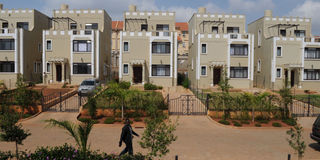Prime
Oil and Gas: How it will create opportunities in housing sector

It is expected that there will be an influx of expertraite staff, thus driving demand for both residential and office space. PHOTO | file
What you need to know:
Experts project that low income housing units will be the real deal especially that demand in oil regions is expected to grow. There seems to be an untapped potential, especially in affordable housing units yet oil and gas activities are likely to drive demand for such facilities upwards.
There is growing optimism about fruition of the oil and gas sector, especially now with the recent signing of Final Investment Decision (FID).
More than three weeks ago, government and joint venture partners, including TotalEnergies, CNOOC, Petroleum Authority of Uganda and the Tanzanian government announced FID, which now sets Uganda’s oil sector on the stage for development.
The stage is one of the last mile events expected to pool investments worth $10b into Uganda. In otherwards, it is the phase that sets the stage for first expected in 2025.
Of course, away from the actual oil sector, investments will spread far and wide, especially in the real estate sector.
Experts expect demand in the sector, driven by an influx of expatriates for oil related companies demanding for both residential and office space, to go up.
Before Covid-19 was first confirmed in Uganda in March 2020, real estate had been one of the fastest growing sectors of the economy. The sector had enjoyed year-on-year growth, especially in demand for residential space both within city centres and suburbs.
However, the growth has since slowed, but is expected to pick up as the economy gains momentum on the back of full reopening.
During pre-Covid-19 - 2019 and backwards – the housing market had been growing with demand for both residential and office space.
According to a 2019 Knight Frank report, demand in residential properties had risen from 69 percent in 2018 to 78 percent, while demand for office space had risen by 3 percent.
Demand, the report shows, was higher in prime locations such as Nakesero, Bugolobi, Kololo and Mbuya due the large number of expatriate staff arriving due to anticipated FID.
However, with Covid-19 disrupting most activities, demand slowed for almost 2020, only picking up in the first half of 2021, especially after the signing a number of oil agreements, among which included development of the East African Crude Oil Pipeline project.
Therefore, now that FID has been signed and all Covid-19 restrictions lifted, one particular sector whose growth is projected to go up, is housing.
According to a Knight Frank report for the period ended 2021, it is reported that TotalEnergies currently needs office space of at least 2050 square meters and 40 apartments for residential space. Unconfirmed reports indicate that CNOOC is in the process of acquiring a three-year contract for space in one of Kololo’s top apartments.
Experts project there will be further competition for both commercial and residential spaces.
“The housing market grows in tandem with other sectors. Right now the economy is recovering from [Covid-19] so, the housing market is projected to expand by more than 200,000 units annually as a result of urbanisation,” says Peter Kalangwa, the Housing Finance Bank head of strategy and business analysis.
Uganda Bureau of Statistics indicates that urbanisation stood at 5.7 per cent in 2021 and is expected to grow further with the emergency of new cities.
Housing deficit
Current projections point to a spike in demand but also note there will be substantial expansion, in the real estate sector both within and outside Kampala.
According to Kalangwa, whereas there has been concentrated growth, particularly in some parts of urban Uganda, the current properties are not enough and the country still has a deficit of about two million units, especially among the medium and low income markets.
The situation is even becomes more fragile in the Albertine region where at least a million people are expected to flock in search of new opportunities and work.
Paul Lukuma, a research fellow at Makerere University, says: “The deficit is explainable because at one point signing the FID looked unlikely. So people had to first hold their investments.”
According to a recent survey conducted by Housing Finance Bank in the Albertine Region, too much focus has been put on infrastructure development such as setting up roads and an airport, among others.
However, beyond this, the survey notes, not much in terms of private sector led investments have been pursued, which obviously complicates matters in case of an influx in the oil region.
Huge opportunities
The deficit in low cost housing market in the urban and rural areas presents huge opportunities. However, the challenge remains capital, owing to the fact that many banks are dealing with stress resulting from effects of Covid-19.
But even then, Lakuma thinks, banks should take priority in oil-related sectors now that there is certainty. “Yes it is understandable that banks have been under pressure but they need to create an enabling environment for small borrowers to access capital. Otherwise the demand will go unanswered,” he says.
Therefore, Lakuma notes, all avenues to avail affordable real estate solutions, should be explored.
By Collins Muhwezi




